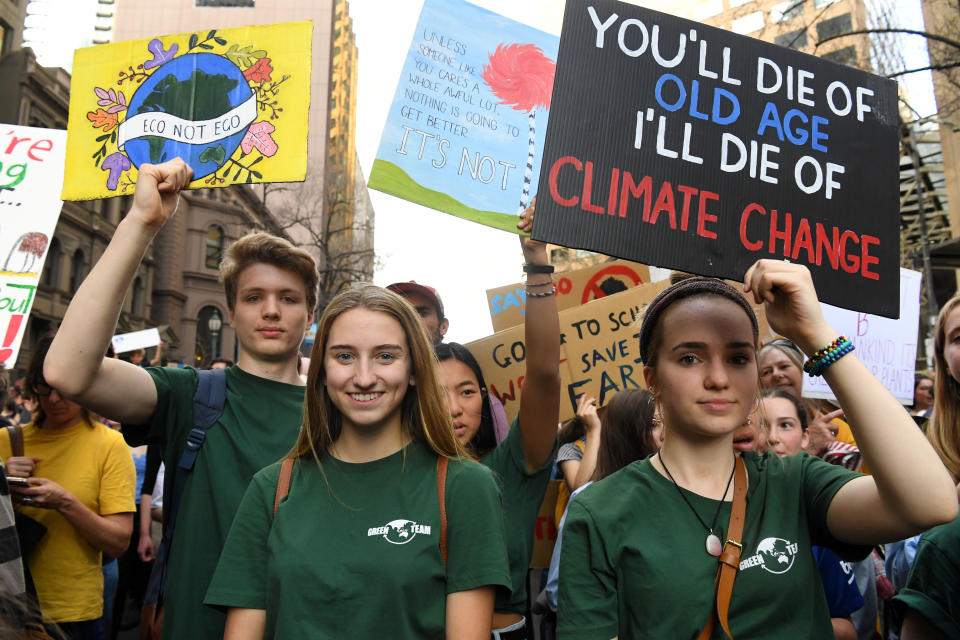The country making climate change a compulsory subject for school kids
Next year Italy will become the first country in the world to make it compulsory for school children to study climate change.
The country’s Education Minister, Lorenzo Fioramonti, made the announcement earlier this week. The politician has been the government's most vocal supporter of green policies and was criticised by the opposition in September for encouraging students to skip school and take part in climate protests.
In an interview in his Rome office on Monday (local time), Mr Fioramonti said all state schools would dedicate 33 hours per year, almost one hour per school week, to climate change issues from the start of the next academic year in September.
Many traditional subjects, such as geography, mathematics and physics, would also be studied from the perspective of sustainable development, said the minister, a former economics professor at South Africa's Pretoria University.
"The entire ministry is being changed to make sustainability and climate the centre of the education model," Mr Fioramonti told Reuters in the interview conducted in English.
"I want to make the Italian education system the first education system that puts the environment and society at the core of everything we learn in school."

Mr Fioramonti, 42, the author of several books arguing gross domestic product should no longer be used as the main measure of countries' economic success, has been a target of the right-wing opposition since becoming a minister in the two-month-old government of 5-Star and the centre-left Democratic Party.
His proposals for new taxes on airline tickets, plastic and sugary foods to raise funds for education were strongly attacked by critics who said Italians were already over-taxed.
He then sparked fury from conservatives when he suggested crucifixes should be removed from Italian classrooms to create a more inclusive environment for non-Christians.
Despite the criticism, the government's 2020 budget presented to parliament this week included both the plastic tax and a new tax on sugary drinks.
"I was ridiculed by everyone and treated like a village idiot, and now a few months later the government is using two of those proposals and it seems to me more and more people are convinced it is the way to go," Mr Fioramonti said.
Scientists foresee 'untold suffering'
More than 11,000 scientists warned Tuesday of "untold suffering" due to global warming, even as another team said Paris carbon-cutting pledges are "too little, too late".
The European Union, meanwhile, confirmed that last month was the warmest October ever registered, fast on heels of a record September and the hottest month ever in July.
Three-quarters of national commitments under the Paris climate accord to curb greenhouse gases will not even slow the accelerating pace of global warming, according to a report from five senior scientists.
The sobering assessment came a day after President Donald Trump formally notified the United Nations of the US withdrawal from the 2015 Paris climate pact, triggering concerns of how other nations might react.
"With few exceptions, the pledges of rich, middle-income and poor nations are insufficient to address climate change," said Robert Watson, who chaired both the UN Intergovernmental Panel on Climate Change (IPCC) and the UN's science body for biodiversity.
"As they stand, the pledges are far too little, too late."

In parallel, more than 11,000 scientists sounded a five-bell alarm in the peer-reviewed journal BioScience, noting that the world had failed to act on global warming despite the accumulation of evidence over 30 years.
"We declare, clearly and unequivocally, that planet Earth is facing a climate emergency," the statement said.
Emissions of the gases warming Earth's surface must drop 50 percent by 2030 and to "net zero" – with no additional carbon entering the atmosphere by mid-century – if the Paris treaty's goal of capping warming at 1.5 to 2.0 degrees Celsius is to be met, the IPCC concluded last year.
And yet 2018 saw unprecedented global carbon pollution of more than 41 billion tonnes, two percent higher that 2017, also a record year.
Global temperatures have increased 1 C above pre-industrial levels – enough to boost the impact of deadly heatwaves, floods and superstorms – and are on track to rise another two or three degrees by the end of the century.

‘Insufficient’ effort from top polluters
At 29 percent of the global total, China alone pumps out more CO2 than the next three nations combined, though about 13 percent of those emissions are generated by exports destined for rich nations, recent research has shown.
India, which is ramping up both renewable energy and carbon-intensive coal-fired power, accounted for seven percent in 2018, and Russia, which has made no pledge at all, added 4.6 percent.
The efforts of the world's top four emitters was deemed "insufficient", according to the report.
–– AFP and AP
Do you have a story tip? Email: newsroomau@yahoonews.com.
You can also follow us on Facebook and Twitter, download the Yahoo News app from the App Store or Google Play and stay up to date with the latest news with Yahoo’s daily newsletter. Sign up here.


